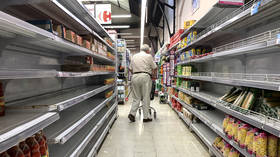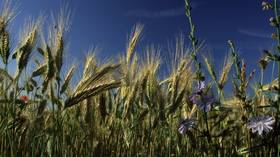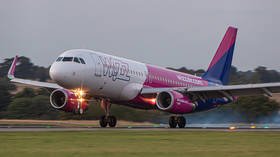Russia responds to food crisis accusations

The US is deliberately turning the situation “upside down” when it claims that the food supply crisis was caused by Russia's special operation in Ukraine and allegedly its actions in the Black and Azov seas, Moscow’s Ambassador to Washington Anatoly Antonov told journalists on Wednesday.
"The Kiev authorities are mining the waters of ports, preventing ships from delivering provisions and other goods to other states. At the same time, our efforts to coordinate the opening of humanitarian corridors continue to be ignored," he claimed, as cited by the Russian Embassy’s Telegram channel.
The diplomat went on to say that Washington persistently refuses to take responsibility for its “foreign economic blunders.”
"[US] claims that anti-Russian restrictions allegedly do not harm our food and fertilizer supplies do not stand up to scrutiny. Apparently, attempts to isolate the Russian financial system and undermine the transport sector capabilities do not count," he stated.
According to Antonov, Moscow is deeply concerned about the situation in global food markets and will continue to fulfill its obligations under international export agreements in terms of agricultural goods and fertilizers.
The US has repeatedly aссused Russia of “disrupting the global food system.” On Wednesday, American President Joe Biden claimed that Moscow’s actions in Ukraine were to be blamed not only for the global food supply shortages, but also for rising prices on American soil. He stated that the US “is fighting on two fronts.”
“At home, it’s inflation and rising prices. Abroad, it’s helping Ukrainians defend their democracy and feeding those who are left hungry around the world because Russian atrocities exist,” Biden said during a visit to an Illinois farm.
Earlier this week, Antonov warned that the US “has been swamped by a wave of Russophobia fuelled by the media at the instigation of the ruling circles.”
"The situation has taken the worst forms of the anti-communist paranoia and witch-hunt of the McCarthy era," he told Newsweek in an interview published on Wednesday.
According to Antonov, “the unprecedentedly wide-spreading campaign to cancel everything Russian is accompanied by baseless and sweeping accusations against our country aimed at creating an image of Russia as an outcast."
He pointed out that even during the Cold War, Moscow and Washington continued cultural, educational and scientific contacts. The diplomat expressed hope that common sense would prevail and “help end the dangerous game of canceling Russia, bordering on the ideas of racial superiority."
Russia attacked the neighboring state in late February, following Ukraine’s failure to implement the terms of the Minsk agreements, first signed in 2014, and Moscow’s eventual recognition of the Donbass republics of Donetsk and Lugansk. The German- and French-brokered protocols were designed to give the breakaway regions special status within the Ukrainian state.
The Kremlin has since demanded that Ukraine officially declare itself a neutral country that will never join the US-led NATO military bloc. Kiev insists the Russian offensive was completely unprovoked and has denied claims it was planning to retake the two republics by force.














